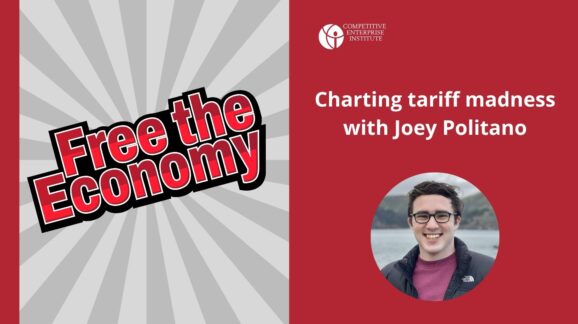There are two main areas in which Congress can enact meaningful reform. The first is to rein in regulatory guidance documents, which we refer to as “regulatory dark matter,” whereby agencies regulate through Federal Register notices, guidance documents, and other means outside standard rulemaking procedure. The second is to enact a series of reforms to increase agency transparency and accountability of all regulation and guidance. These include annual regulatory report cards for rulemaking agencies and regulatory cost estimates from the Office of Management and Budget for more than just a small subset of rules.
In 2019, President Trump signed two executive orders aimed at stopping the practice of agencies using guidance documents to effectively implement policy without going through the legally required notice and comment process.
Featured Posts

Blog
An executive order to make freedom mandatory
The White House Office of Management and Budget’s (OMB) new “Streamlining the Review of Regulatory Actions” memorandum signals a potentially transformative shift in Washington’s…

Blog
Free the Economy podcast: Charting tariff madness with Joey Politano
In this week’s episode we talk about changes in consumer credit, disappearing fast-food jobs in California, and six things the climate movement…

Forbes
Regulation Renovation: The Executive Order To Make Deregulation Permanent
The White House Office of Management and Budget’s new Streamlining the Review of Regulatory Actions memorandum signals a preferential stance toward deregulation, urging…
Search Posts
Blog
Consumer Product Safety Law Backfires, Killing Thousands of Jobs
A consumer-product safety law recently passed by Congress will drive up the price of children’s clothes and toys and put thousands of small toymakers…
Blog
Regulating Our Way to Recovery
Normal 0 false false false MicrosoftInternetExplorer4 Tucked in the massive stimulus bill passed by the House Appropriation Committee is a $4.5 billion appropriation for…
Blog
TV Transition follies: Plaguing consumers then and now.
Looks like the “digital television transition” to abandon analog and make high-definition broadcasts the standard is not going to happen as planned, but is…
Blog
The New Green Economy?
I’ve spent a while crunching the numbers relating to energy and environment spending in the stimulus bill. The bill will spend about $80 billion on…
Blog
Avoiding Political Erectile Dysfunction
According to the Congressional Budget Office, “Bailout to Nowhere” money for the proposed new infrastructure stimulus won’t be spent within the next two years–far too…
Blog
The Not So Good, the Bad, and the Really Ugly
Not all stimulus programs are created equal. If the goal of the latest economic bailout package that Congress is considering is as President Elect Obama…
Staff & Scholars

Clyde Wayne Crews
Fred L. Smith Fellow in Regulatory Studies
- Business and Government
- Consumer Freedom
- Deregulation

Ryan Young
Senior Economist
- Antitrust
- Business and Government
- Regulatory Reform

Fred L. Smith, Jr.
Founder; Chairman Emeritus
- Automobiles and Roads
- Aviation
- Business and Government

Sam Kazman
Counsel Emeritus
- Antitrust
- Automobiles and Roads
- Banking and Finance

Marlo Lewis, Jr.
Senior Fellow
- Climate
- Energy
- Energy and Environment